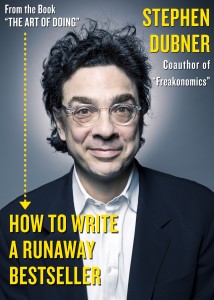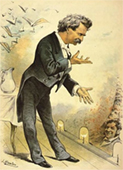 In the process of working on “The Art of Doing,” we assimilated dozens of life lessons, tactics and tips—some that even helped us write this book. Stephen Dubner coauthor of the freakishly phenomenal “Freakonomics,” a book that has sold over 4 million copies, spawned a blog, a radio show, and of course, more books, told us,
In the process of working on “The Art of Doing,” we assimilated dozens of life lessons, tactics and tips—some that even helped us write this book. Stephen Dubner coauthor of the freakishly phenomenal “Freakonomics,” a book that has sold over 4 million copies, spawned a blog, a radio show, and of course, more books, told us,
“Writing was originally a way to preserve oral speech and I’ve never forgotten that….I prefer to write in a way that draws on the oral tradition.”
This was a lesson he learned as a child. Dubner’s family wrote its own DIY newspaper, the Quaker Street Quacker. And being the youngest of eight children, Dubner found competition to be published fierce. His mother would sit with him at the kitchen table and say, “Well, let’s read this out loud and see how it sounds.”
Dubner, who once fronted a rock band, considers writing and music twins. He uses repetition, call-and-response and varies the lengths of his words and sentences the way a composer varies musical notes and phrases. And Dubner, who has written five books and hundreds of articles (most of which will be read silently by his readers), never forgot his mother’s advice, telling us,
“After writing every sentence, I read the words aloud.”
Even though we sometimes felt pretty silly, we tried this, too—reading aloud what we wrote. Surprisingly we found the ear to be an unrelenting critic. Hearing your own written words can be cringe-worthy. You can’t miss the clunky construction, uncommon word usage and convoluted logic. You’ll also hear when a sentence sings.
So whether it’s a memo or a memoir, a Tweet or a term paper, according to Dubner, listening to your writing by speaking the words aloud can help you write with greater clarity, simplicity and directness.
 Oral Tradition Fact: 1906, Mark Twain begins to speak his autobiography aloud to a stenographer, accumulating half a million words. According to The New York Times, Twain argued that “speaking his recollections and his opinions, rather than writing them down, allowed him to adopt a more natural colloquial and frank tone….” Or as Twain himself put it, “One would expect dictated stuff to read like an impromptu speech, brokenly, catchily, repetitiously, & marred by absence of coherence, fluent movement, & the happy things that didn’t come till the speech was done—but it isn’t so.” 2010, Autobiography of Mark Twain Vol. 1 is published and becomes a bestseller.
Oral Tradition Fact: 1906, Mark Twain begins to speak his autobiography aloud to a stenographer, accumulating half a million words. According to The New York Times, Twain argued that “speaking his recollections and his opinions, rather than writing them down, allowed him to adopt a more natural colloquial and frank tone….” Or as Twain himself put it, “One would expect dictated stuff to read like an impromptu speech, brokenly, catchily, repetitiously, & marred by absence of coherence, fluent movement, & the happy things that didn’t come till the speech was done—but it isn’t so.” 2010, Autobiography of Mark Twain Vol. 1 is published and becomes a bestseller.
